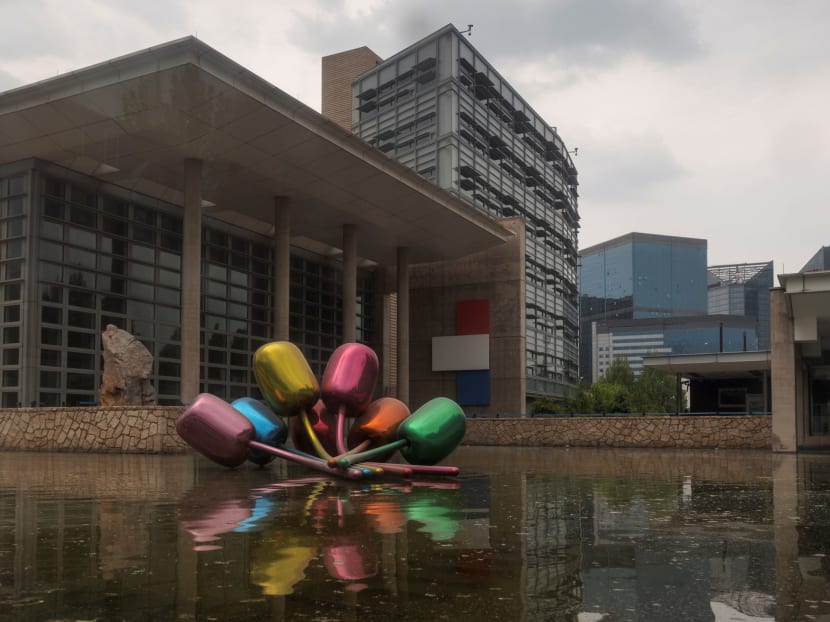US embassy in Beijing apologises for comparing Chinese students to playful puppies
HONG KONG — The US embassy to China has apologised for a social media post that compared Chinese students applying for visas to puppies wanting to play, which was criticised by online users as insensitive and derogatory.
HONG KONG — The US embassy to China has apologised for a social media post that compared Chinese students applying for visas to puppies wanting to play, which was criticised by online users as insensitive and derogatory.
The post, which has since been deleted, contained a video showing a puppy escaping its pen, with a caption that said "spring is here and flowers are blooming, are you like this puppy desperate to go play?"
"The US embassy's student visa application service has resumed in phases. What are you waiting for?" said the post, which was first published on Weibo, China's equivalent of Twitter, on Wednesday (May 5).
The comparison angered Chinese online users who consider it derogatory — many insults in Chinese contain the word dog, such as a "running dog" meaning someone who grovels. This led many to believe the post was mocking Chinese students or intellectuals who wanted to go to the US.
A Weibo hashtag for the topic was viewed over five million times, with more than 1,200 users joining the discussion by Thursday.
An embassy spokesperson told the South China Morning Post the Weibo announcement was meant to be lighthearted and humorous, however it was taken down immediately when the embassy saw it had not been received in that spirit.
"We have the utmost respect for all Chinese people, certainly including Chinese students. We apologise if anyone was offended, that was certainly not our intention," the spokesperson said.
The incident put a damper on what was a goodwill gesture by the US. The resumption of US visa applications for Chinese students came after Washington imposed a travel ban on those travelling from China. The ban, a reaction to the coronavirus pandemic, lasted over a year.
The two countries have also been embroiled in tensions over trade, technology and human rights.
Nationalist comic artist Liu Ludong, who has almost 6.5 million followers on Weibo, said the Americans had poked fun at Chinese intellectuals and the post was racist.
"According to American conventions, comparing Chinese overseas students to dogs, this must be a form of racial discrimination," said Mr Liu on Weibo on Wednesday.
Ms Iris Li, a Beijing native who was among the first Chinese students to receive her US visa after services resumed this week, said the post felt like it was published by an intern.
"I think the embassy staff were trying really hard to win back some goodwill but have messed it up," Ms Li told the Post.
She received a bookmark along with her visa, which promoted the US college tradition of exploring knowledge, debating and challenging different viewpoints and freedom of speech. A banner at the embassy also said "USA welcomes Chinese students", according to Ms Li.
Ms Li said these gestures were attempts to be friendly but aspects of the incident — such as the bookmark and the video of the puppy escaping — inadvertently revealed US embassy staff attitudes about the lack of freedom of speech in China.
"Maybe I'm overreading it, but that was the feeling the gestures gave me. But I still think they are sincere and I was touched, and I feel they did value me for a little while," Ms Li said.
Others have tried to defend the American embassy by saying the post could have been a cross-cultural misunderstanding.
US-based Chinese scholar Qiao Mu said the term dog in American culture tended to have positive connotations, whereas in Chinese culture and idioms, it was mostly negative.
"If there was no political significance here, the comparison was not culturally appropriate and created discomfort in people. Maybe they made a mistake in their expression," the scholar said on Weibo on Wednesday.
Mr William Bistransky, acting consul-general at the US embassy in Beijing, said last week the resumption of visa appointments was sending a signal to Chinese students that Americans "welcome foreign students into our homes or communities or universities".
More than 3,000 online applications were submitted in the first hour of appointment booking opening, according to Bistransky. SOUTH CHINA MORNING POST







